Walbank F.W., Astin A.E., Frederiksen M.W., Ogilvie R.M. The Cambridge Ancient History, Volume 7, Part 1: The Hellenistic World
Подождите немного. Документ загружается.


THE AFRICAN CAMPAIGNS 397
Cyrenaica since 322, nominally under the suzerainty of Ptolemy I but
de
facto as an independent ruler. His country was thus immediately
adjoining Punic territory. Agathocles offered Ophelias Carthage's
African possessions, while claiming for himself dominion over all Sicily.
If he
—
Agathocles
—
should later entertain higher ambitions, then it
would be towards Italy that he would extend his rule, not towards
Africa, whither he had now come by force of circumstance. Ophelias
willingly accepted this proposal, which opened the prospect of founding
a great African empire and thus accorded with his own plans. He had
coins struck showing the medicinal plant silphium, the symbol of
Cyrene, and the date palm, the emblem of Carthage. Ophelias used his
great influence in Greece to persuade entire families to take part in the
expedition. As Greece at that time was plagued by incessant wars and
internal unrest, many colonists joined him in the hope of finding a new
home in the fertile region of Africa. Ophelias finally left Cyrene in the
summer of 308 with more than 10,000 infantry, 600 cavalry and 100
chariots; besides this there were about 10,000 non-combatants, includ-
ing many women and children. The Cyrenaic border town of Automala
(near the altars of
the
Philaeni) was reached in a few days; after a further
two months' extremely arduous march through the desert of Tripolis
most of the emigrants reached the Syracusan headquarters, where
Agathocles gave them a friendly reception. For reasons that are not
apparent, however — perhaps over the question of the supreme
command
—
the two leaders soon disagreed. Agathocles felt threatened
and resolved to forestall Ophelias. While most of the troops from
Cyrene were out searching for provisions their camp was captured and
Ophelias himself was murdered. It cannot be accepted that Agathocles
had been playing a treacherous game from the outset, as is sometimes
claimed
in
ancient accounts and modern histories. Such
a
desperate step
as
an attack on an allied army within sight of the enemy is generally taken
only out of dire necessity. The now leaderless army of Ophelias entered
the service of
Agathocles;
the colonists who were no use as soldiers and
the women and children were to be sent to Sicily, but most of them died
during the crossing. The grand colonization plan of the Cyrenean ruler
was thus a complete failure (October/November 308 B.C.).
The incorporation of Ophelias' soldiers into Agathocles' army almost
doubled the latter's strength. The Carthaginians, on the other hand,
were verging on civil war at about this time as a result of an attempt by
Bomilcar to seize absolute power. The moment seemed propitious, as
the Punic forces were on campaign against the Numidians. In any
conflict between the Carthaginian government and a general it is
difficult to say who first showed disloyalty towards the other. In
the present case we do not know whether Bomilcar had cause for
Cambridge Histories Online © Cambridge University Press, 2008
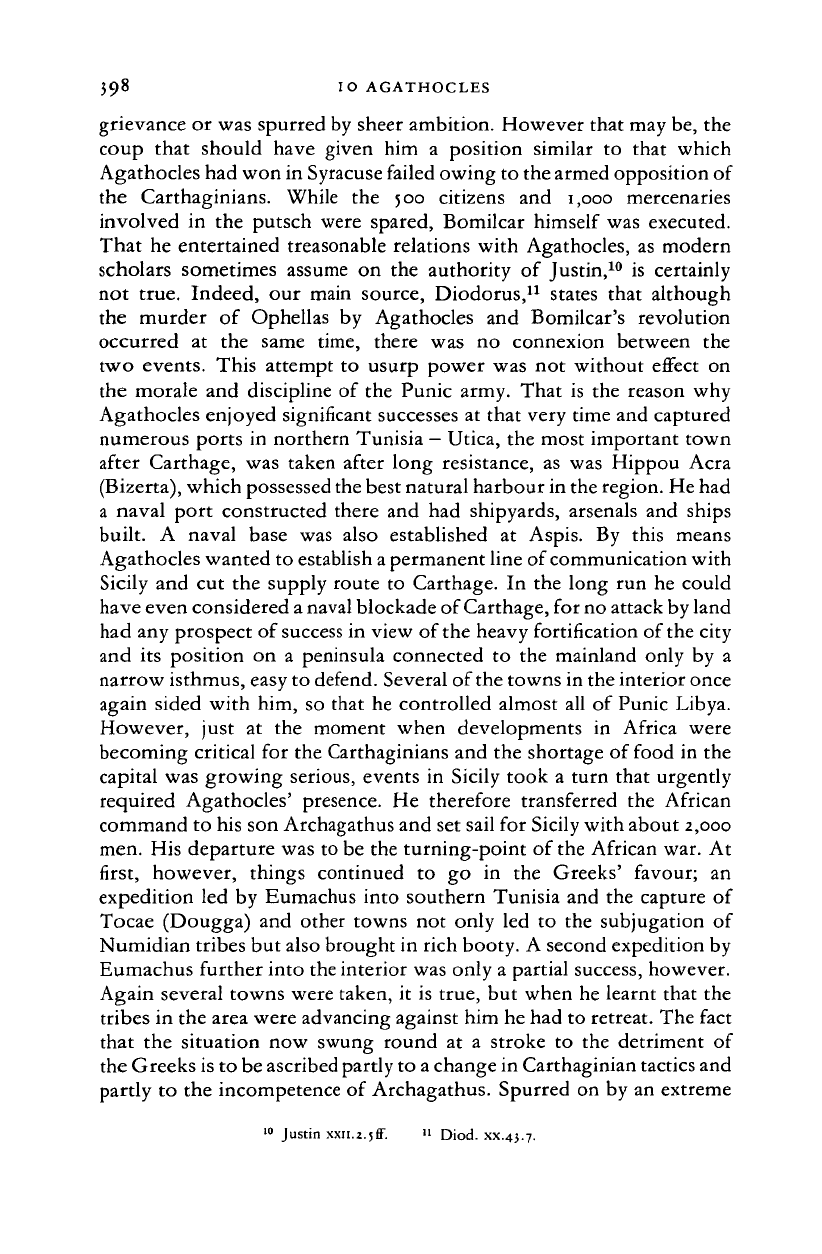
398 IO
AGATHOCLES
grievance or was spurred by sheer ambition. However that may be, the
coup that should have given him a position similar to that which
Agathocles had won in Syracuse failed owing to the armed opposition of
the Carthaginians. While the 500 citizens and 1,000 mercenaries
involved in the putsch were spared, Bomilcar himself was executed.
That he entertained treasonable relations with Agathocles, as modern
scholars sometimes assume on the authority of Justin,
10
is certainly
not true. Indeed, our main source, Diodorus,
11
states that although
the murder of Ophelias by Agathocles and Bomilcar's revolution
occurred at the same time, there was no connexion between the
two events. This attempt to usurp power was not without effect on
the morale and discipline of the Punic army. That is the reason why
Agathocles enjoyed significant successes at that very time and captured
numerous ports in northern Tunisia
—
Utica, the most important town
after Carthage, was taken after long resistance, as was Hippou Acra
(Bizerta), which possessed the best natural harbour in the region. He had
a naval port constructed there and had shipyards, arsenals and ships
built. A naval base was also established at Aspis. By this means
Agathocles wanted to establish
a
permanent line of communication with
Sicily and cut the supply route to Carthage. In the long run he could
have even considered
a
naval blockade of Carthage, for no attack by land
had any prospect of success in view of the heavy fortification of the city
and its position on a peninsula connected to the mainland only by a
narrow isthmus, easy to defend. Several of the towns in the interior once
again sided with him, so that he controlled almost all of Punic Libya.
However, just at the moment when developments in Africa were
becoming critical for the Carthaginians and the shortage of food in the
capital was growing serious, events in Sicily took a turn that urgently
required Agathocles' presence. He therefore transferred the African
command to his son Archagathus and set sail for Sicily with about 2,000
men. His departure was to be the turning-point of the African war. At
first, however, things continued to go in the Greeks' favour; an
expedition led by Eumachus into southern Tunisia and the capture of
Tocae (Dougga) and other towns not only led to the subjugation of
Numidian tribes but also brought in rich booty. A second expedition by
Eumachus further into the interior was only a partial success, however.
Again several towns were taken, it is true, but when he learnt that the
tribes in the area were advancing against him he had to retreat. The fact
that the situation now swung round at a stroke to the detriment of
the Greeks is to be ascribed partly to
a
change in Carthaginian tactics and
partly to the incompetence of Archagathus. Spurred on by an extreme
10
Justin
XXII.2.jff.
»
Diod.
xx.43.7.
Cambridge Histories Online © Cambridge University Press, 2008
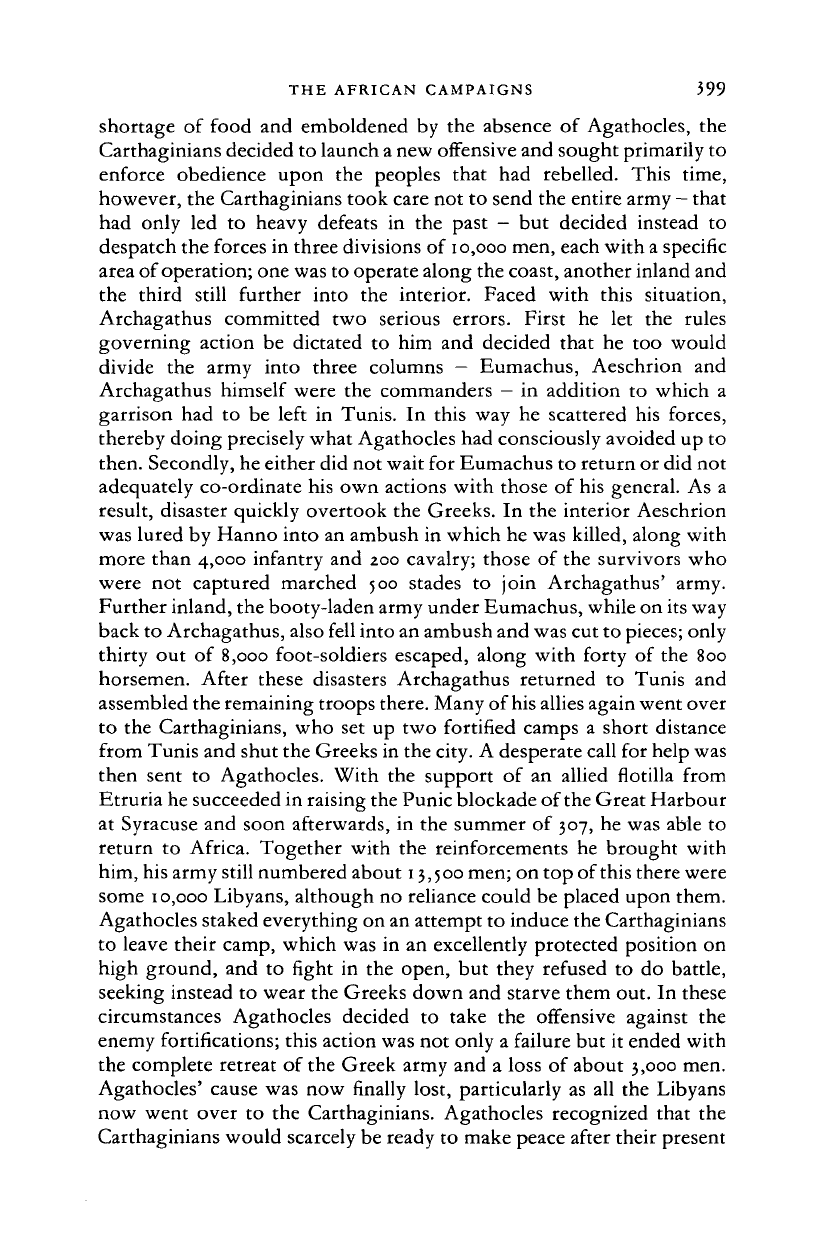
THE AFRICAN CAMPAIGNS 399
shortage of food and emboldened by the absence of Agathocles, the
Carthaginians decided to launch
a
new offensive and sought primarily to
enforce obedience upon the peoples that had rebelled. This time,
however, the Carthaginians took care not to send the entire army
—
that
had only led to heavy defeats in the past
—
but decided instead to
despatch the forces in three divisions of 10,000 men, each with
a
specific
area of operation; one was to operate along the coast, another inland and
the third still further into the interior. Faced with this situation,
Archagathus committed two serious errors. First he let the rules
governing action be dictated to him and decided that he too would
divide the army into three columns
—
Eumachus, Aeschrion and
Archagathus himself were the commanders - in addition to which a
garrison had to be left in Tunis. In this way he scattered his forces,
thereby doing precisely what Agathocles had consciously avoided up to
then. Secondly, he either did not wait for Eumachus to return or did not
adequately co-ordinate his own actions with those of his general. As a
result, disaster quickly overtook the Greeks. In the interior Aeschrion
was lured by Hanno into an ambush in which he was killed, along with
more than 4,000 infantry and 200 cavalry; those of the survivors who
were not captured marched 500 stades to join Archagathus' army.
Further inland, the booty-laden army under Eumachus, while on its way
back to Archagathus, also fell into an ambush and was cut to
pieces;
only
thirty out of
8,000
foot-soldiers escaped, along with forty of the 800
horsemen. After these disasters Archagathus returned to Tunis and
assembled the remaining troops there. Many of his allies again went over
to the Carthaginians, who set up two fortified camps a short distance
from Tunis and shut the Greeks in the city. A desperate call for help was
then sent to Agathocles. With the support of an allied flotilla from
Etruria he succeeded in raising the Punic blockade of the Great Harbour
at Syracuse and soon afterwards, in the summer of 307, he was able to
return to Africa. Together with the reinforcements he brought with
him, his army still numbered about 13,500 men; on top of this there were
some 10,000 Libyans, although no reliance could be placed upon them.
Agathocles staked everything on an attempt to induce the Carthaginians
to leave their camp, which was in an excellently protected position on
high ground, and to fight in the open, but they refused to do battle,
seeking instead to wear the Greeks down and starve them out. In these
circumstances Agathocles decided to take the offensive against the
enemy fortifications; this action was not only a failure but it ended with
the complete retreat of the Greek army and a loss of about 3,000 men.
Agathocles' cause was now finally lost, particularly as all the Libyans
now went over to the Carthaginians. Agathocles recognized that the
Carthaginians would scarcely be ready to make peace after their present
Cambridge Histories Online © Cambridge University Press, 2008
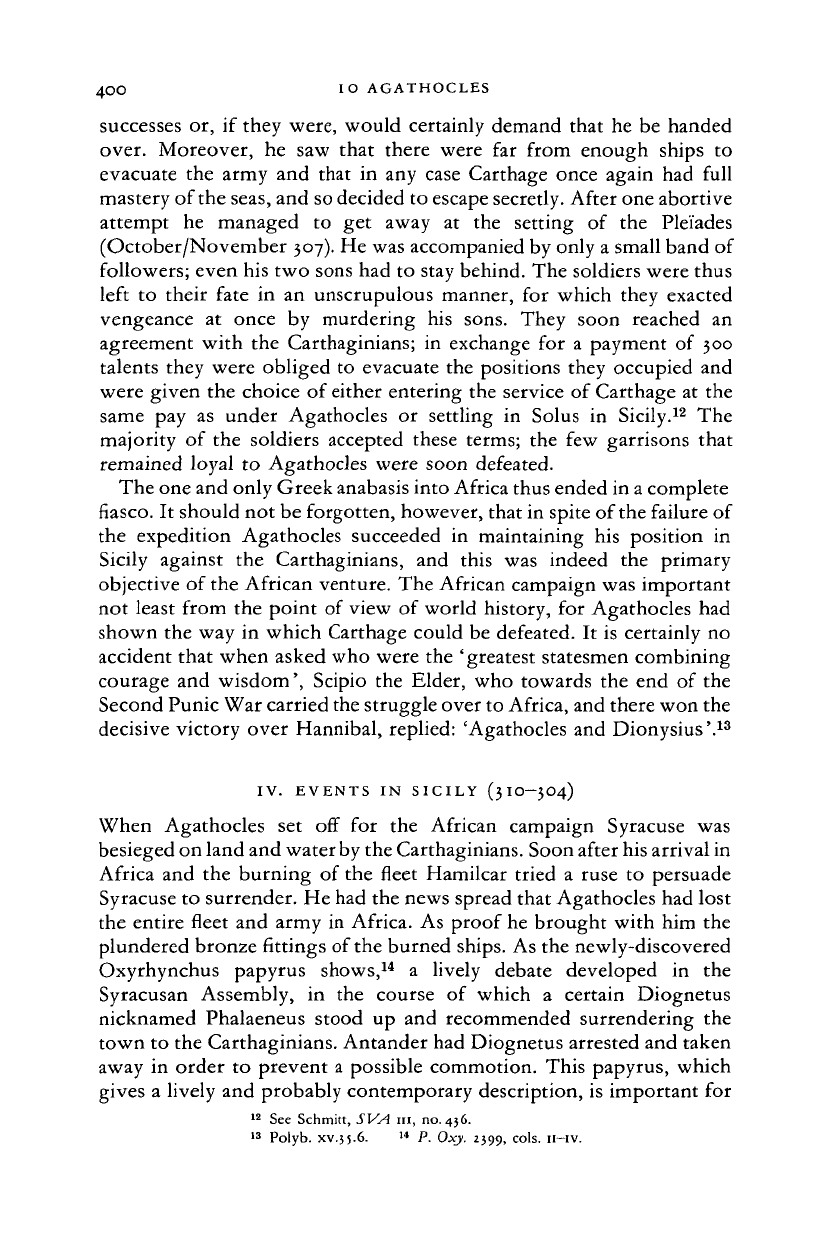
400 IO
AGATHOCLES
successes or, if they were, would certainly demand that he be handed
over. Moreover, he saw that there were far from enough ships to
evacuate the army and that in any case Carthage once again had full
mastery of the seas, and so decided to escape secretly. After one abortive
attempt he managed to get away at the setting of the Pleiades
(October/November 307). He was accompanied by only a small band of
followers; even his two sons had to stay behind. The soldiers were thus
left to their fate in an unscrupulous manner, for which they exacted
vengeance at once by murdering his sons. They soon reached an
agreement with the Carthaginians; in exchange for a payment of 300
talents they were obliged to evacuate the positions they occupied and
were given the choice of either entering the service of Carthage at the
same pay as under Agathocles or settling in Solus in Sicily.
12
The
majority of the soldiers accepted these terms; the few garrisons that
remained loyal to Agathocles were soon defeated.
The one and only Greek anabasis into Africa thus ended in a complete
fiasco. It should not be forgotten, however, that in spite of
the
failure of
the expedition Agathocles succeeded in maintaining his position in
Sicily against the Carthaginians, and this was indeed the primary
objective of the African venture. The African campaign was important
not least from the point of view of world history, for Agathocles had
shown the way in which Carthage could be defeated. It is certainly no
accident that when asked who were the 'greatest statesmen combining
courage and wisdom', Scipio the Elder, who towards the end of the
Second Punic War carried the struggle over to Africa, and there won the
decisive victory over Hannibal, replied: 'Agathocles and Dionysius'.
13
IV. EVENTS IN SICILY (3IO-3O4)
When Agathocles set off for the African campaign Syracuse was
besieged on land and water
by
the Carthaginians. Soon after his arrival in
Africa and the burning of the fleet Hamilcar tried a ruse to persuade
Syracuse to surrender. He had the news spread that Agathocles had lost
the entire fleet and army in Africa. As proof he brought with him the
plundered bronze fittings of the burned ships. As the newly-discovered
Oxyrhynchus papyrus shows,
14
a lively debate developed in the
Syracusan Assembly, in the course of which a certain Diognetus
nicknamed Phalaeneus stood up and recommended surrendering the
town to the Carthaginians. Antander had Diognetus arrested and taken
away in order to prevent a possible commotion. This papyrus, which
gives a lively and probably contemporary description, is important for
12
See Schmitt, SVA in, no. 456.
13
Polyb. xv.35.6.
u
P. Oxy. 2399, cols. 11—iv.
Cambridge Histories Online © Cambridge University Press, 2008
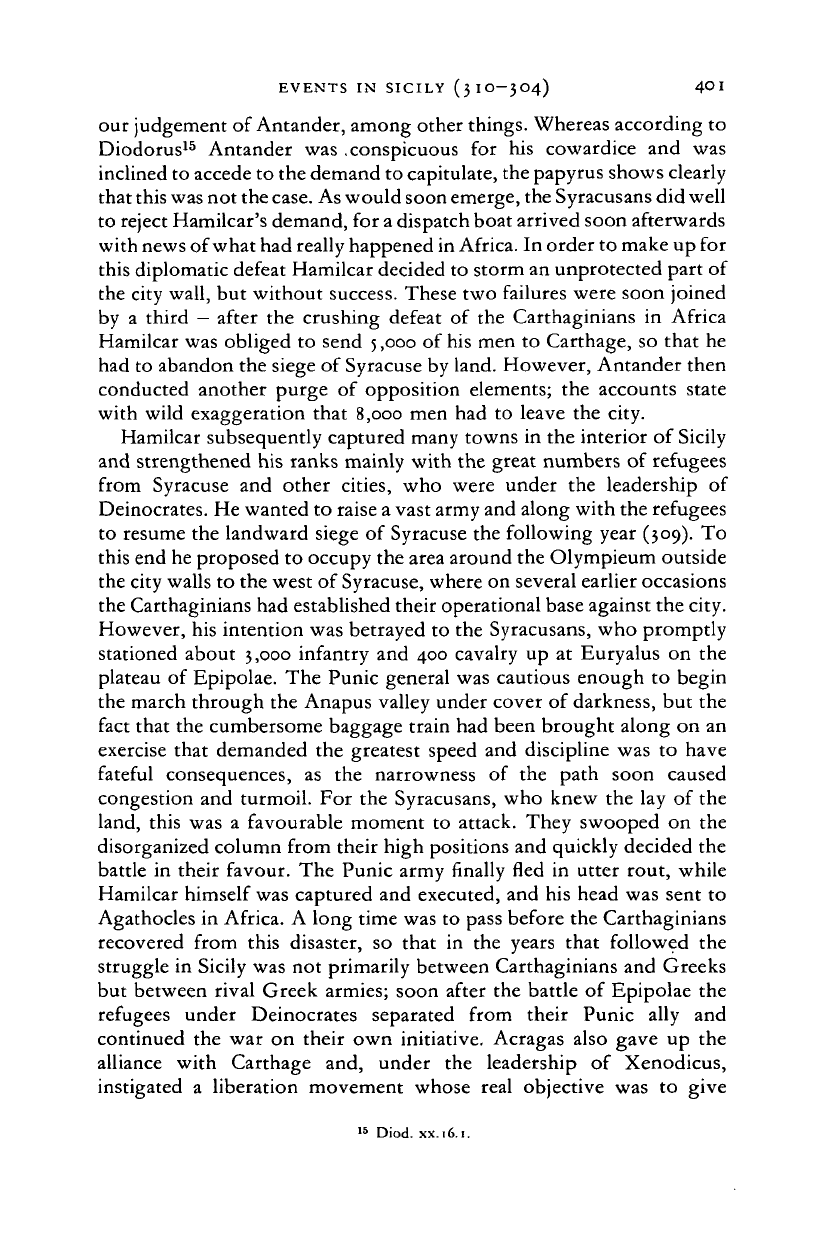
EVENTS IN SICILY (310-304) 4°
I
our judgement of Antander, among other things. Whereas according to
Diodorus
15
Antander was .conspicuous
for his
cowardice
and was
inclined to accede to the demand to capitulate, the papyrus shows clearly
that this
was
not the
case.
As
would soon
emerge,
the Syracusans did well
to reject Hamilcar's demand, for a dispatch boat arrived soon afterwards
with news of what had really happened in Africa. In order to make up for
this diplomatic defeat Hamilcar decided to storm an unprotected part of
the city wall, but without success. These two failures were soon joined
by
a
third
-
after the crushing defeat
of
the Carthaginians
in
Africa
Hamilcar was obliged to send
5,000
of his men to Carthage, so that he
had to abandon the siege of Syracuse by land. However, Antander then
conducted another purge
of
opposition elements; the accounts state
with wild exaggeration that
8,000
men had
to
leave the city.
Hamilcar subsequently captured many towns in the interior of Sicily
and strengthened his ranks mainly with the great numbers of refugees
from Syracuse
and
other cities, who were under
the
leadership
of
Deinocrates. He wanted to raise a vast army and along with the refugees
to resume the landward siege of Syracuse the following year (309). To
this end he proposed to occupy the area around the Olympieum outside
the city walls to the west of Syracuse, where on several earlier occasions
the Carthaginians had established their operational base against the city.
However, his intention was betrayed to the Syracusans, who promptly
stationed about 3,000 infantry and 400 cavalry up
at
Euryalus on the
plateau of Epipolae. The Punic general was cautious enough to begin
the march through the Anapus valley under cover of darkness, but the
fact that the cumbersome baggage train had been brought along on an
exercise that demanded the greatest speed and discipline was
to
have
fateful consequences,
as the
narrowness
of the
path soon caused
congestion and turmoil. For the Syracusans, who knew the lay of the
land, this was
a
favourable moment
to
attack. They swooped
on
the
disorganized column from their high positions and quickly decided the
battle in their favour. The Punic army finally fled
in
utter rout, while
Hamilcar himself was captured and executed, and his head was sent
to
Agathocles in Africa. A long time was to pass before the Carthaginians
recovered from this disaster,
so
that
in the
years that followed
the
struggle in Sicily was not primarily between Carthaginians and Greeks
but between rival Greek armies; soon after the battle
of
Epipolae the
refugees under Deinocrates separated from their Punic ally
and
continued the war
on
their own initiative. Acragas also gave up the
alliance with Carthage
and,
under
the
leadership
of
Xenodicus,
instigated
a
liberation movement whose real objective was
to
give
15
Diod. xx.
16.1.
Cambridge Histories Online © Cambridge University Press, 2008
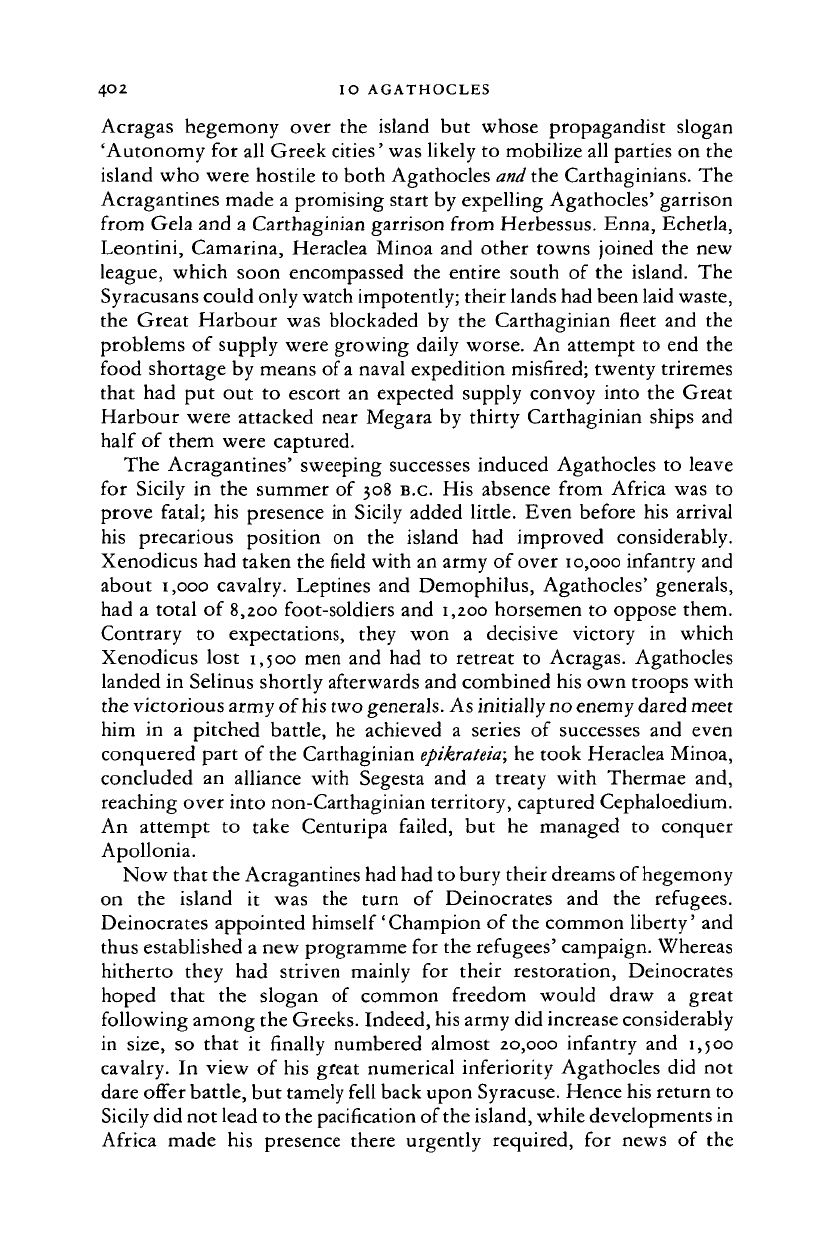
4©2 IO
AGATHOCLES
Acragas hegemony over the island but whose propagandist slogan
'Autonomy for all Greek cities' was likely to mobilize all parties on the
island who were hostile to both Agathocles
and
the Carthaginians. The
Acragantines made a promising start by expelling Agathocles' garrison
from Gela and a Carthaginian garrison from Herbessus. Enna, Echetla,
Leontini, Camarina, Heraclea Minoa and other towns joined the new
league, which soon encompassed the entire south of the island. The
Syracusans could only watch impotently; their lands had been laid waste,
the Great Harbour was blockaded by the Carthaginian fleet and the
problems of supply were growing daily worse. An attempt to end the
food shortage by means of
a
naval expedition misfired; twenty triremes
that had put out to escort an expected supply convoy into the Great
Harbour were attacked near Megara by thirty Carthaginian ships and
half of them were captured.
The Acragantines' sweeping successes induced Agathocles to leave
for Sicily in the summer of 308
B.C.
His absence from Africa was to
prove fatal; his presence in Sicily added little. Even before his arrival
his precarious position on the island had improved considerably.
Xenodicus had taken the field with an army of over 10,000 infantry and
about 1,000 cavalry. Leptines and Demophilus, Agathocles' generals,
had a total of
8,200
foot-soldiers and 1,200 horsemen to oppose them.
Contrary to expectations, they won a decisive victory in which
Xenodicus lost 1,500 men and had to retreat to Acragas. Agathocles
landed in Selinus shortly afterwards and combined his own troops with
the victorious army of his two
generals.
As initially no enemy dared meet
him in a pitched battle, he achieved a series of successes and even
conquered part of the Carthaginian
epikrateia;
he took Heraclea Minoa,
concluded an alliance with Segesta and a treaty with Thermae and,
reaching over into non-Carthaginian territory, captured Cephaloedium.
An attempt to take Centuripa failed, but he managed to conquer
Apollonia.
Now that the Acragantines had had to bury their dreams of hegemony
on the island it was the turn of Deinocrates and the refugees.
Deinocrates appointed himself'Champion of the common liberty' and
thus established a new programme for the refugees' campaign. Whereas
hitherto they had striven mainly for their restoration, Deinocrates
hoped that the slogan of common freedom would draw a great
following among the Greeks. Indeed, his army did increase considerably
in size, so that it finally numbered almost 20,000 infantry and 1,500
cavalry. In view of his great numerical inferiority Agathocles did not
dare offer battle, but tamely fell back upon Syracuse. Hence his return to
Sicily did not lead to the pacification of the island, while developments in
Africa made his presence there urgently required, for news of the
Cambridge Histories Online © Cambridge University Press, 2008
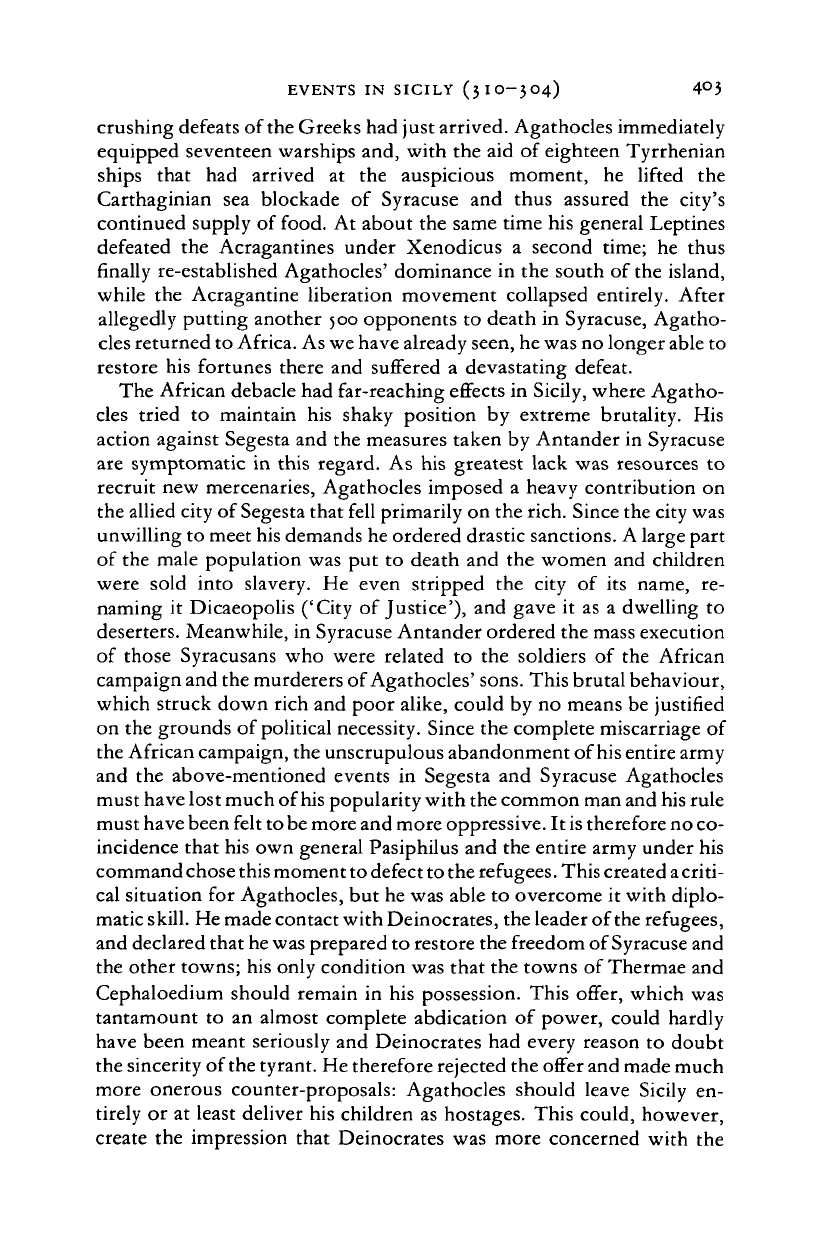
EVENTS IN SICILY (3IO—304) 4°3
crushing defeats of the Greeks had just arrived. Agathocles immediately
equipped seventeen warships and, with the aid of eighteen Tyrrhenian
ships that had arrived at the auspicious moment, he lifted the
Carthaginian sea blockade of Syracuse and thus assured the city's
continued supply of food. At about the same time his general Leptines
defeated the Acragantines under Xenodicus a second time; he thus
finally re-established Agathocles' dominance in the south of the island,
while the Acragantine liberation movement collapsed entirely. After
allegedly putting another 500 opponents to death in Syracuse, Agatho-
cles returned to Africa. As we have already seen, he was no longer able to
restore his fortunes there and suffered a devastating defeat.
The African debacle had far-reaching effects in Sicily, where Agatho-
cles tried to maintain his shaky position by extreme brutality. His
action against Segesta and the measures taken by Antander in Syracuse
are symptomatic in this regard. As his greatest lack was resources to
recruit new mercenaries, Agathocles imposed a heavy contribution on
the allied city of Segesta that fell primarily on the rich. Since the city was
unwilling to meet his demands he ordered drastic sanctions. A large part
of the male population was put to death and the women and children
were sold into slavery. He even stripped the city of its name, re-
naming it Dicaeopolis ('City of Justice'), and gave it as a dwelling to
deserters. Meanwhile, in Syracuse Antander ordered the mass execution
of those Syracusans who were related to the soldiers of the African
campaign and the murderers of Agathocles' sons. This brutal behaviour,
which struck down rich and poor alike, could by no means be justified
on the grounds of political necessity. Since the complete miscarriage of
the African campaign, the unscrupulous abandonment of his entire army
and the above-mentioned events in Segesta and Syracuse Agathocles
must have lost much of his popularity with the common man and his rule
must have been felt
to be
more and more oppressive. It
is
therefore no co-
incidence that his own general Pasiphilus and the entire army under his
command chose this moment
to
defect
to
the refugees. This created a criti-
cal situation for Agathocles, but he was able to overcome it with diplo-
matic skill. He made contact with Deinocrates, the leader of the refugees,
and declared that he was prepared to restore the freedom of Syracuse and
the other towns; his only condition was that the towns of Thermae and
Cephaloedium should remain in his possession. This offer, which was
tantamount to an almost complete abdication of power, could hardly
have been meant seriously and Deinocrates had every reason to doubt
the sincerity of the tyrant. He therefore rejected the offer and made much
more onerous counter-proposals: Agathocles should leave Sicily en-
tirely or at least deliver his children as hostages. This could, however,
create the impression that Deinocrates was more concerned with the
Cambridge Histories Online © Cambridge University Press, 2008

404
IO
AGATHOCLES
leading position he had won than with the restoration of Syracusan
freedom. This was exactly what Agathocles hoped to achieve. He thus
succeeded in discrediting his opponent and shaking the faith of many of
Deinocrates' adherents. As a confrontation with his rival was now
inevitable, Agathocles decided to make peace with Carthage by offering
substantial concessions, thus securing freedom of action on that front.
The settlement restored the status
quo
ante,
that is to say the situation
prevailing before the beginning of the war in 312/11 B.C.; Agathocles
evacuated the towns of the Carthaginian
epikrateia
that he had occupied
- primarily Heraclea Minoa, Selinus, Segesta and Thermae - and
received in exchange 200,000 bushels of grain and gold to the value of
150 Greek silver talents.
16
In the same year (306
B.C.)
the so-called
Philinus treaty between Carthage and Rome was signed whereby the
Romans were barred from all Sicily and the Carthaginians from all Italy.
The historicity of this treaty was unjustly challenged by Polybius;
17
its
content proves that Rome was now a significant factor in the power
equation and was recognized as such by Carthage.
Having made peace with the Carthaginians, Agathocles could
concentrate entirely on the conflict with Deinocrates. Once again, he
was far inferior in numbers. We are told that his
5,000
infantry and some
500 cavalry were ranged against more than 25,000 foot-soldiers and
3,000 horsemen. The deciding battle was fought at Torgium, whose
location is unknown. Its outcome was determined to a large extent by
the fact that more than 2,000 men from Deinocrates' army rallied to
Agathocles during the engagement. This led to panic in the refugee
army, which prematurely assumed all was lost and took flight. The
cavalry under Deinocrates retreated to a town called Ambicae, while
part of the infantry - by one account 7,000, by another 4,000 - took
positions on a hilltop. Agathocles agreed peace terms with these
soldiers, assured them that they could return home and persuaded them
to leave the hill; then, we are told, he had them put to death nevertheless.
This information is undoubtedly a gross exaggeration. Agathocles
probably had only his most stubborn opponents killed but allowed the
remaining refugees to return to their home towns. Most of them
doubtless accepted this offer after the years of war and
exile.
They clearly
recognized the futility of further opposition and seem to have reached an
arrangement with Agathocles somehow or other. At any rate, in the
years that follow we hear of neither any active opposition to Agathocles
nor the tyrant's customary reprisals against the oligarchs and their
adherents. Instead, the sources
18
state that once he had finally con-
16
See Schmitt, SVA in, no. 437.
17
Polyb. in.26; the treaty had been recorded by the historian Philinus (FGrH 174F
1).
Cf. K.
Meister, 'Der sogenannte Philinosvertrag', Riv. Fil. 98 (1970) 408-23.
18
Polyb. ix.23.2.
Cambridge Histories Online © Cambridge University Press, 2008
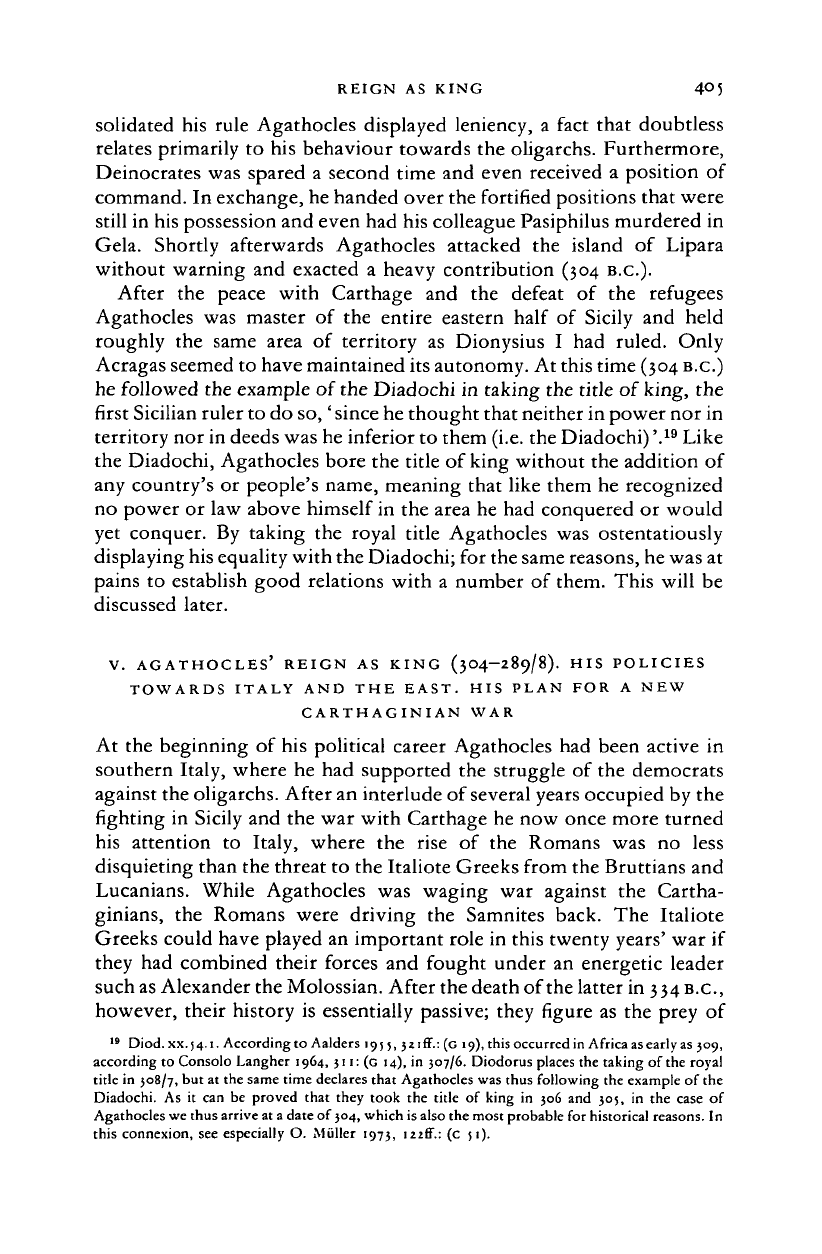
REIGN AS KING 4°5
solidated his rule Agathocles displayed leniency,
a
fact that doubtless
relates primarily
to
his behaviour towards the oligarchs. Furthermore,
Deinocrates was spared
a
second time and even received
a
position
of
command. In exchange, he handed over the fortified positions that were
still in his possession and even had his colleague Pasiphilus murdered in
Gela. Shortly afterwards Agathocles attacked
the
island
of
Lipara
without warning and exacted
a
heavy contribution (304 B.C.).
After
the
peace with Carthage
and the
defeat
of the
refugees
Agathocles was master
of
the entire eastern half
of
Sicily
and
held
roughly
the
same area
of
territory
as
Dionysius
I had
ruled. Only
Acragas seemed to have maintained its autonomy. At this time (304 B.C.)
he followed the example of the Diadochi in taking the title
of
king, the
first Sicilian ruler to do so,' since he thought that neither in power nor in
territory nor in deeds was he inferior to them (i.e. the Diadochi)'.
19
Like
the Diadochi, Agathocles bore the title of king without the addition of
any country's
or
people's name, meaning that like them he recognized
no power
or
law above himself in the area he had conquered
or
would
yet conquer.
By
taking
the
royal title Agathocles was ostentatiously
displaying his equality with the Diadochi; for the same reasons, he was at
pains
to
establish good relations with
a
number
of
them. This will
be
discussed later.
V. AGATHOCLES' REIGN AS KING (304—289/8). HIS POLICIES
TOWARDS ITALY AND THE EAST. HIS PLAN FOR A NEW
CARTHAGINIAN WAR
At the beginning
of
his political career Agathocles had been active
in
southern Italy, where
he
had supported the struggle
of
the democrats
against the oligarchs. After an interlude of several years occupied by the
fighting in Sicily and the war with Carthage he now once more turned
his attention
to
Italy, where
the
rise
of the
Romans
was no
less
disquieting than the threat to the Italiote Greeks from the Bruttians and
Lucanians. While Agathocles
was
waging
war
against
the
Cartha-
ginians,
the
Romans were driving
the
Samnites back.
The
Italiote
Greeks could have played an important role in this twenty years' war if
they had combined their forces and fought under
an
energetic leader
such
as
Alexander the Molossian. After the death of the latter in 334 B.C.,
however, their history
is
essentially passive; they figure
as
the prey
of
19
Diod.
xx.54.1.
According to Aalders 195;,
3 z
iff.:
(G
19),
this occurred in Africa
as
early
as
309,
according to Consolo Langher 1964,
311:
(G
14),
in
307/6. Diodorus places the taking of the royal
title in 308/7, but at the same time declares that Agathocles was thus following the example of the
Diadochi.
As it can be
proved that they took
the
title
of
king
in
306
and
305,
in the
case
of
Agathocles we thus arrive at a date of
304,
which is also the most probable for historical reasons.
In
this connexion, see especially O. Miiller 1973,
I22ff.:
(c
JI).
Cambridge Histories Online © Cambridge University Press, 2008
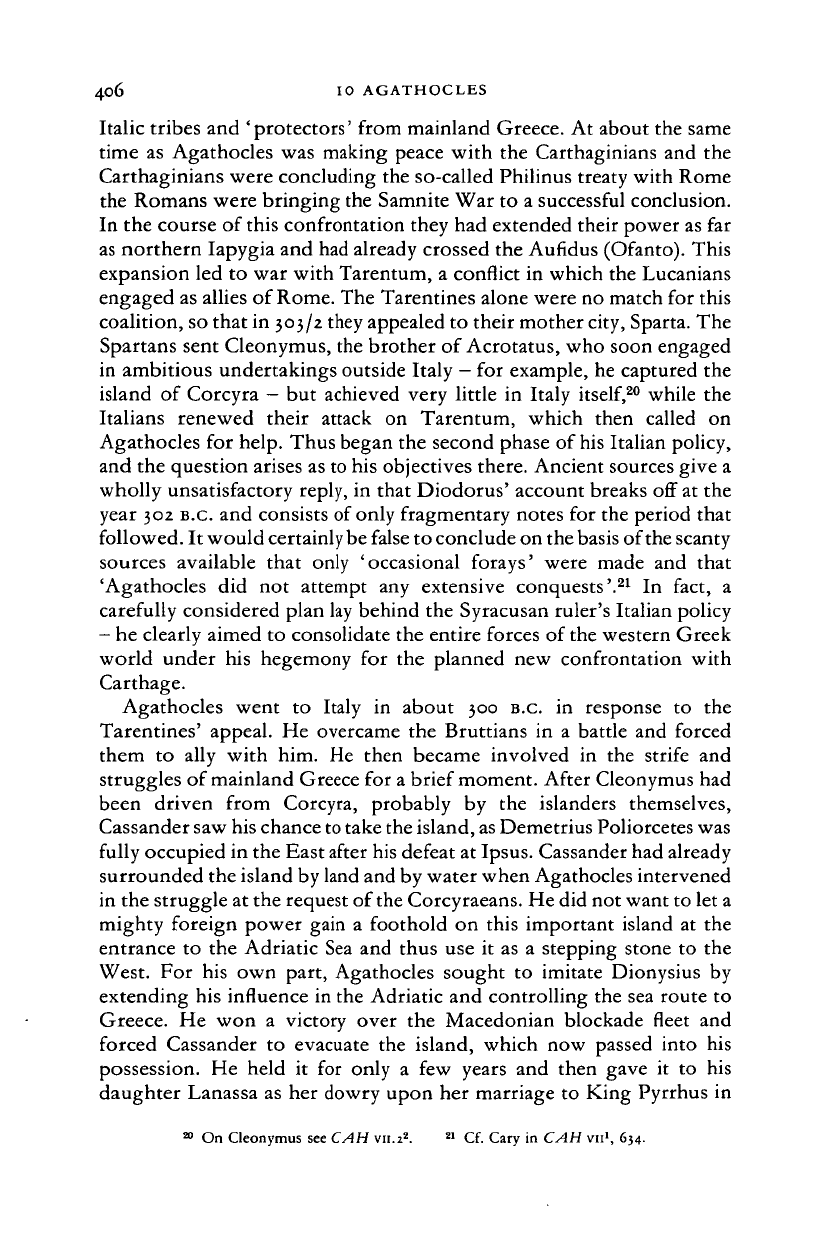
4<D6
10 AGATHOCLES
Italic tribes
and
'protectors' from mainland Greece.
At
about
the
same
time
as
Agathocles
was
making peace with
the
Carthaginians
and the
Carthaginians were concluding
the
so-called Philinus treaty with Rome
the Romans were bringing
the
Samnite
War to a
successful conclusion.
In
the
course
of
this confrontation they
had
extended their power
as far
as northern Iapygia
and had
already crossed
the
Aufidus (Ofanto). This
expansion
led to war
with Tarentum,
a
conflict
in
which
the
Lucanians
engaged
as
allies
of
Rome.
The
Tarentines alone were
no
match
for
this
coalition,
so
that
in
303/2 they appealed
to
their mother city, Sparta.
The
Spartans sent Cleonymus,
the
brother
of
Acrotatus,
who
soon engaged
in ambitious undertakings outside Italy
- for
example,
he
captured
the
island
of
Corcyra
- but
achieved very little
in
Italy
itself,
20
while
the
Italians renewed their attack
on
Tarentum, which then called
on
Agathocles
for
help. Thus began
the
second phase
of
his Italian policy,
and
the
question arises
as to his
objectives there. Ancient sources give
a
wholly unsatisfactory reply,
in
that Diodorus' account breaks
off
at
the
year
302
B.C.
and
consists
of
only fragmentary notes
for the
period that
followed.
It
would certainly be false to conclude on the basis of the scanty
sources available that only 'occasional forays' were made
and
that
'Agathocles
did not
attempt
any
extensive conquests'.
21
In
fact,
a
carefully considered plan lay behind
the
Syracusan ruler's Italian policy
-
he
clearly aimed
to
consolidate
the
entire forces
of
the western Greek
world under
his
hegemony
for the
planned
new
confrontation with
Carthage.
Agathocles went
to
Italy
in
about
300
B.C.
in
response
to the
Tarentines' appeal.
He
overcame
the
Bruttians
in a
battle
and
forced
them
to
ally with
him. He
then became involved
in the
strife
and
struggles
of
mainland Greece
for a
brief moment. After Cleonymus
had
been driven from Corcyra, probably
by the
islanders themselves,
Cassander saw his chance
to
take the island,
as
Demetrius Poliorcetes was
fully occupied
in the
East after his defeat
at
Ipsus. Cassander had already
surrounded the island by land and
by
water when Agathocles intervened
in
the
struggle
at
the request
of
the
Corcyraeans.
He did not
want
to let a
mighty foreign power gain
a
foothold
on
this important island
at the
entrance
to the
Adriatic
Sea and
thus
use it as a
stepping stone
to the
West.
For his own
part, Agathocles sought
to
imitate Dionysius
by
extending
his
influence
in the
Adriatic
and
controlling
the sea
route
to
Greece.
He won a
victory over
the
Macedonian blockade fleet
and
forced Cassander
to
evacuate
the
island, which
now
passed into
his
possession.
He
held
it for
only
a few
years
and
then gave
it to his
daughter Lanassa
as her
dowry upon
her
marriage
to
King Pyrrhus
in
20
On
Cleonymus
see CAH
vn.z
2
.
Z1
Cf.
Cary
in CAH
VII
1
,
634.
Cambridge Histories Online © Cambridge University Press, 2008
